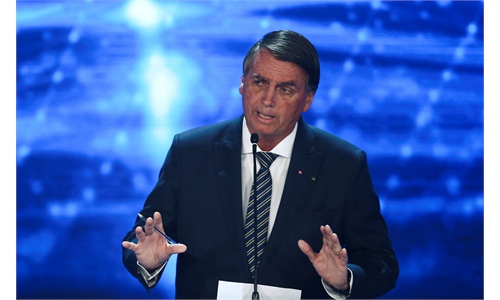Brazil to face deepening political polarization after tighter than expected first round election

Photos: CFP
Political polarization will continue to deepen and political violence is likely to happen during the following election, Chinese experts predicted as far-right incumbent Brazilian President Jair Bolsonaro and his leftist rival former president Luiz Inacio Lula da Silva are set for a runoff election at the end of this month after a tighter than expected first round.
With fierce competition between the two candidates, tensions between supporters on both sides have risen. In his speech, Bolsonaro referred to his supporters as "an army." Lula has received sporadic threats of attack since the election campaign officially kicked off in mid-August, and his campaign team has urged him to wear bulletproof vests at public events. Chinese experts warned that the January 6 US Capitol Hill riot may repeat in Brazil, but the largest emerging country in the southern hemisphere is expected to maintain friendly and cooperative relations with China, especially economic cooperation, no matter which party comes into office.
With 99.7 percent of electronic votes counted, Lula was ahead with 48.4 percent of votes versus 43.3 percent for Bolsonaro, the national electoral authority reported on Sunday night. As neither candidate won a majority, the race will go to a second-round vote on October 30, Reuters reported.
Before Sunday's vote, several opinion surveys had shown the leftist Lula, who was president from 2003 to 2010, leading the far-right Bolsonaro by 10-15 percentage points. The tight result dashed hopes of a quick resolution to a deeply polarized election in the world's fourth-largest democracy, Reuters said.
Unlike the overwhelming victory predicted by pollsters and the media, Lula only had a less than 5 percent lead over Bolsonaro, which means that Lula is not a sure win for the second round of the election, Xu Shicheng, a research fellow in Latin American studies at the Chinese Academy of Social Sciences, told the Global Times on Monday.
During the less than a month's time remaining, both presidential candidates entering the final race will be doing their best to win over voters in the middle, Xu noted.
Xu noted that the narrow gap between the two candidates in the first round of voting reflects the serious division in Brazil, and will have a significant impact on the subsequent election, intensifying polarization and possibly even generating political violence in the country.
The expert pointed out that Brazil has a large voter base and uses electronic counting. If Bolsonaro loses the election and his margin of victory over Lula is still small, Bolsonaro may copy the path of former US president Donald Trump and refuse to recognize the election results.
"There is a possibility that Brazil could see the same version of the Capitol riot that followed the US presidential election in 2020," Xu said.
On January 6, 2021, hundreds of supporters of then US president Donald Trump overwhelmed police officers as they stormed the US Capitol in Washington, DC, in an attempt to violently prevent the certification of Joe Biden's election victory.
Fear have also arisen among analysts that the far-right Bolsonaro, who idolizes Trump, may refuse to accept the result if he loses, paving the way for a January 6-style institutional breakdown in Latin America's biggest country, according to Reuters report.
Brazil's elections chief and Supreme Court Justice Edson Fachinon had warned as early as in May that Brazil could face a similar assault amid growing attacks on its democratic institutions ahead of October's presidential election.
Similar to Trump criticizing an electronic voting system widely used by election authorities across the US for losing him millions of votes, Bolsonaro has also said during this year's election that if he loses, it will be because the voting was rigged, according to BBC.
Rare intensity
The election in Brazil has shown a rare intensity of party rivalry and left-right confrontation. Following it, social confrontation, including threats, intimidation and political violence, have grown, which, experts say, is not only a reflection of the inherent structural contradictions of Brazil's politics and economy, but also a microcosm of "polarized politics" in the context of the COVID-19 pandemic and global turmoil.
Experts with the United Nations expressed their concerns in September regarding the ongoing defamatory campaign and continued attacks against democratic institutions, such as the judiciary and the electoral system in Brazil, including the electronic electoral system.
They called on the Brazilian authorities to protect and duly respect the work of electoral institutions.
Xu pointed out that Lula and Bosonaro, who belong to different political camps, have many differences in their political views.
Analyzing the current vote share, Lula's lead is partly due to his achievements in poverty alleviation during his past years in office, Xu said. Xu noted that during his administration, Lula had proposed a "Zero Hunger" strategy, gaining the support of many lower- and middle-class workers, while Bosonaro's supporters are mostly entrepreneurs.
Lula opposed privatization and advocated more taxes on the rich, while Bosonaro advocated privatization and pension reform; in foreign relations, Lula created the Union of South American Nations (USAN) and supported Latin American integration, while during Bosonaro's term, Brazil withdrew from USAN and suspended its participation in the Community of Latin American and Caribbean States.
As the largest emerging country in the southern hemisphere, Brazil's political trends are a regional wind vane. If Lula is elected, it will push the return of the left-wing in the region, which will inevitably have an important impact on the geopolitics of Latin America and the reconstruction of international order, analysts pointed out.
Before the Brazil election, the region had already seen a shift in its political preference indicated by a surge in the election of left-wing leaders amid the economic and social crises aggravated by the pandemic.
Recent elections in Chile, Honduras, Peru and Bolivia have led to claims that Latin America is going through another "pink tide," the political movement that saw the rise of left-wing leaders across the continent in the early 2000s, according to media reports.
Several media reports have predicted that if Lula wins the election, it will mean a leftward shift in the political direction of the Brazil after many years, as well as a clearer or crescendo of the leftist wave in Latin America.
Xu said that the return of left-wing forces reflects the trend of Latin American countries to actively seek change in the face of pandemic shocks, economic challenges and social divisions.
"But today, there are subtle distinctions within the Latin American left-wingers between old and new politicians, and between establishment and anti-establishment factions," he noted.
Lula has sought to woo centrist voters by neutralizing some left-wing policies in his election promises, Xu said.
In the past, Latin America has been regarded as the "backyard" of the US. The post-election relationship between Brazil and the US has raised wide concerns. In an interview with Fox News in late June, Bolsonaro said that if the left wins the October election in Brazil, it will never leave power as South America will turn completely red, virtually isolating the US, Bloomberg reported.
Xu pointed out that since the Biden administration held the Summit of the Americas in June, contradictions in US-Latin America relations have come to the fore.
"If Lula is elected, friction between Brazil and the US will increase in some international arenas. But on the other hand, in the fields of economics and trade, Mexico, Argentina and other Latin American countries are still dependent on the US," he said.
"However, no matter whether a left or right government comes into power, Brazil will continue to maintain friendly and cooperative relations with China, especially to strengthen economic cooperation," the expert noted.
In recent years, China and Brazil have achieved fruitful economic and trade cooperation, with bilateral trade exceeding $100 billion for four consecutive years and China maintaining its position as Brazil's largest trading partner for 13 consecutive years.
According to official data, in the first quarter of 2022, China's exports to Brazil totaled about $19 billion, accounting for 23 percent of Brazil's total imports. China's imports from Brazil totaled $19.7 billion, accounting for 29 percent of Brazil's total exports.



